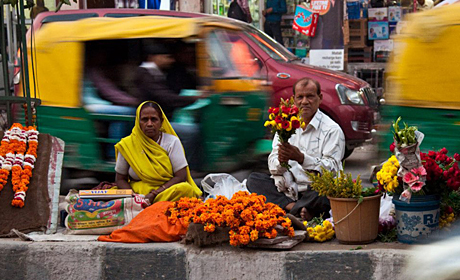UN Women survey on violence in Delhi: 95 per cent of women and girls feel unsafe in public spaces
Date:
“I have started carrying pepper spray to protect myself. My parents have become more protective, they want to know where I’m going, when I’ll be back and with whom I’m hanging out,” says Srishti, a 20-year-old Delhi student who feels unsafe when she leaves her house.
Her fears reflect the broader and growing societal concern about escalating violence against women and girls in India’s capital city, New Delhi. These have been heightened by a horrific gang rape of a 23-year-old Delhi student on 16 December, which resulted in her death.

During interviews with women, it was found that the presence of hawkers and late night eateries at major transport hubs makes them safer for women. Photo credit: UN Women/Gaganjit Singh
But even before the headlines about that case circled the country and the globe, public fear was mounting in Delhi, and such worries were quantified in a newly released household survey conducted by UN Women and the International Center for Research on Women. Conducted from October to November 2012, it reveals that at that time, only 5 per cent of women and girls ranked public spaces in Delhi as ‘safe’ in terms of sexual violence.
The data was collected as part of the baseline survey of the Safer Cities Free of Violence against Women and Girls Initiative by UN Women, the Government of Delhi and JAGORI. The programme in New Delhi is part of a larger global initiative which aims to empower women and their communities in diverse settings in five cities: Cairo (Egypt), Kigali (Rwanda), New Delhi (India), Port Moresby (Papua New Guinea) and Quito (Ecuador).
Providing a stark picture of the daily experience of women and girls, 51 per cent of men reported that they have ever perpetrated sexual harassment or violence against women and girls in public spaces in Delhi. A surprising 25 per cent said they had done so in the last six months.
In cases of sexual violence, many men blamed women for their behaviour. Three out of four agreed with the statement ‘Women provoke men by the way they dress’ and two men out of five fully or partially agreed with the statement ‘Women moving around at night deserve to be sexually harassed’.
Not surprisingly, nearly 73 per cent of women said they do not feel safe in their own surroundings and reported feeling unsafe all the time.
“Change of mind-sets is a long drawn process and requires great efforts, perseverance and patience. Common perceptions relating to controlling the mobility of women may not actually have any positive effect. Involving young men in this programme is essential to make it effective,” says Mr Rajiv Kale, Director, Department of Women and Child Development, Government of Delhi. The Government of Delhi is a key partner in the Safe Cities initiative in New Delhi along with UN Women and civil society partner, Jagori.
The household survey was conducted among a representative sample of 2001 women and girls and 1003 men and boys in the age group of 16-49 years of age in Delhi. The data was collected from seven areas of Delhi: Malviya Nagar, Badarpur, Molarband, Zakir Nagar, Hari Nagar, Shahpurjat and Mayur Vihar Phase-I.
Women safety audits are being conducted, as part of the programme, by UN Women partner JAGORI in selected areas to exploring the elements of public spaces that contribute towards creating safety or vulnerability. Poor lighting near bus stops and subways, lack of public toilets for women and generalized fear have been the main concerns raised by women during these audits. The survey, along with women safety audits and the Safe Cities Strategic Framework will guide work to make Delhi safer for women.
“Sexual harassment and violence in public spaces must not be tolerated. We need to join hands and work together to change existing attitudes and behaviours. This is everyone’s responsibility – men, women, families as well as service providers” says Anne F. Stenhammer, UN Women’s Regional Representative for India, Bhutan, Maldives and Sri Lanka.
Read More: http://www.unwomensouthasia.org/2012/are-our-cities-safe-for-women-2/